Legal Analysis of Contract Misrepresentation: The Gym & Tonic Case
VerifiedAdded on 2023/06/05
|6
|2286
|337
Case Study
AI Summary
This assignment presents a case study involving Karen and Gym & Tonic, analyzing whether Karen can terminate her contract due to misrepresentation and if she is liable for a $100 fee. It applies relevant contract law principles and the Australian Consumer Law (ACL), particularly sections 18 and 29 concerning misleading and deceptive conduct. The analysis concludes that Gym & Tonic likely violated both common law principles of misrepresentation and the ACL, entitling Karen to sue for damages and a refund of her fees. Additionally, the assignment includes a short response question analyzing the Mabo case and its implications for native title in Australia, discussing key legal and political questions raised by the decision, and comparing it to the Yorta Yorta case.
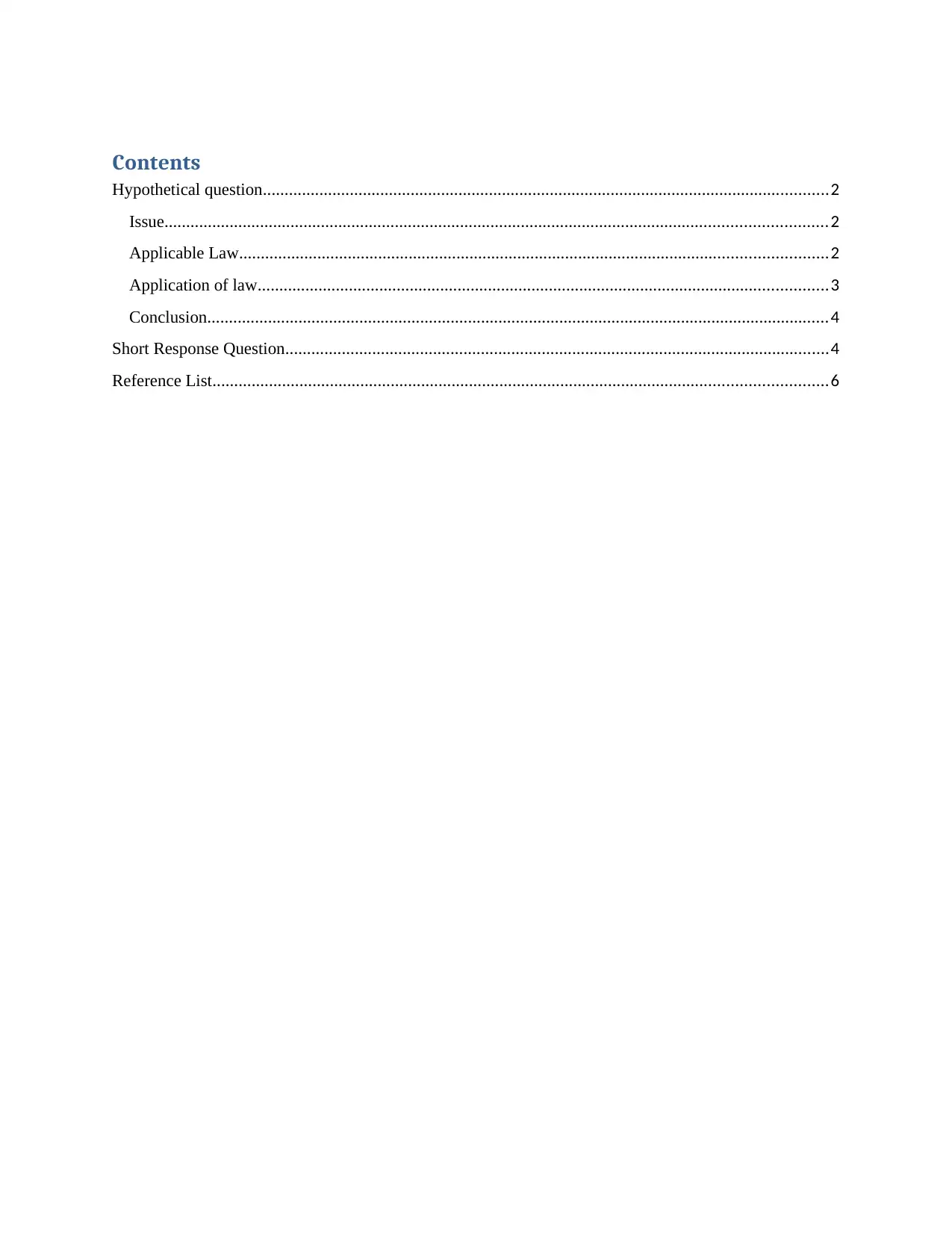
Contents
Hypothetical question..................................................................................................................................2
Issue........................................................................................................................................................2
Applicable Law.......................................................................................................................................2
Application of law...................................................................................................................................3
Conclusion...............................................................................................................................................4
Short Response Question.............................................................................................................................4
Reference List.............................................................................................................................................6
Hypothetical question..................................................................................................................................2
Issue........................................................................................................................................................2
Applicable Law.......................................................................................................................................2
Application of law...................................................................................................................................3
Conclusion...............................................................................................................................................4
Short Response Question.............................................................................................................................4
Reference List.............................................................................................................................................6
Paraphrase This Document
Need a fresh take? Get an instant paraphrase of this document with our AI Paraphraser
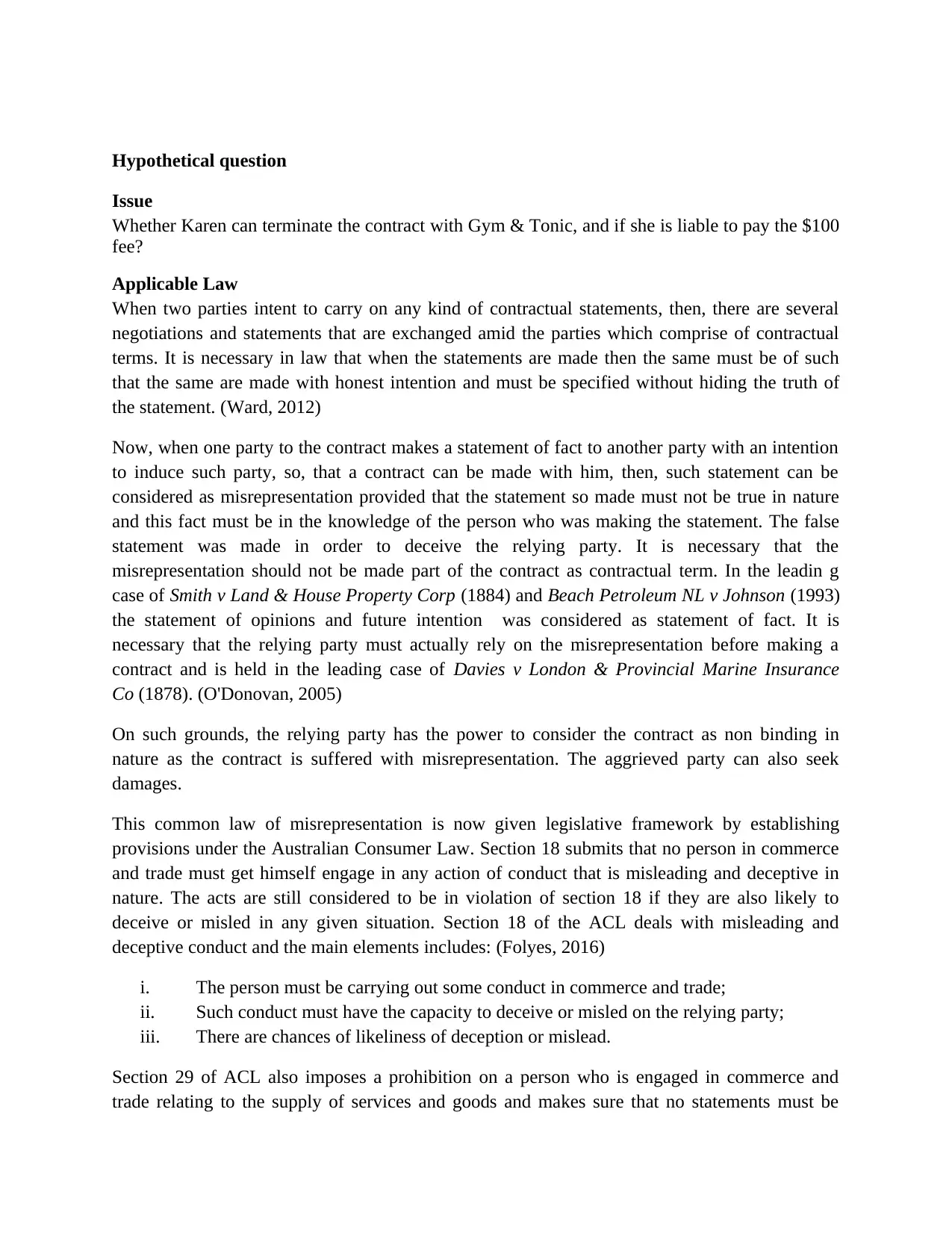
Hypothetical question
Issue
Whether Karen can terminate the contract with Gym & Tonic, and if she is liable to pay the $100
fee?
Applicable Law
When two parties intent to carry on any kind of contractual statements, then, there are several
negotiations and statements that are exchanged amid the parties which comprise of contractual
terms. It is necessary in law that when the statements are made then the same must be of such
that the same are made with honest intention and must be specified without hiding the truth of
the statement. (Ward, 2012)
Now, when one party to the contract makes a statement of fact to another party with an intention
to induce such party, so, that a contract can be made with him, then, such statement can be
considered as misrepresentation provided that the statement so made must not be true in nature
and this fact must be in the knowledge of the person who was making the statement. The false
statement was made in order to deceive the relying party. It is necessary that the
misrepresentation should not be made part of the contract as contractual term. In the leadin g
case of Smith v Land & House Property Corp (1884) and Beach Petroleum NL v Johnson (1993)
the statement of opinions and future intention was considered as statement of fact. It is
necessary that the relying party must actually rely on the misrepresentation before making a
contract and is held in the leading case of Davies v London & Provincial Marine Insurance
Co (1878). (O'Donovan, 2005)
On such grounds, the relying party has the power to consider the contract as non binding in
nature as the contract is suffered with misrepresentation. The aggrieved party can also seek
damages.
This common law of misrepresentation is now given legislative framework by establishing
provisions under the Australian Consumer Law. Section 18 submits that no person in commerce
and trade must get himself engage in any action of conduct that is misleading and deceptive in
nature. The acts are still considered to be in violation of section 18 if they are also likely to
deceive or misled in any given situation. Section 18 of the ACL deals with misleading and
deceptive conduct and the main elements includes: (Folyes, 2016)
i. The person must be carrying out some conduct in commerce and trade;
ii. Such conduct must have the capacity to deceive or misled on the relying party;
iii. There are chances of likeliness of deception or mislead.
Section 29 of ACL also imposes a prohibition on a person who is engaged in commerce and
trade relating to the supply of services and goods and makes sure that no statements must be
Issue
Whether Karen can terminate the contract with Gym & Tonic, and if she is liable to pay the $100
fee?
Applicable Law
When two parties intent to carry on any kind of contractual statements, then, there are several
negotiations and statements that are exchanged amid the parties which comprise of contractual
terms. It is necessary in law that when the statements are made then the same must be of such
that the same are made with honest intention and must be specified without hiding the truth of
the statement. (Ward, 2012)
Now, when one party to the contract makes a statement of fact to another party with an intention
to induce such party, so, that a contract can be made with him, then, such statement can be
considered as misrepresentation provided that the statement so made must not be true in nature
and this fact must be in the knowledge of the person who was making the statement. The false
statement was made in order to deceive the relying party. It is necessary that the
misrepresentation should not be made part of the contract as contractual term. In the leadin g
case of Smith v Land & House Property Corp (1884) and Beach Petroleum NL v Johnson (1993)
the statement of opinions and future intention was considered as statement of fact. It is
necessary that the relying party must actually rely on the misrepresentation before making a
contract and is held in the leading case of Davies v London & Provincial Marine Insurance
Co (1878). (O'Donovan, 2005)
On such grounds, the relying party has the power to consider the contract as non binding in
nature as the contract is suffered with misrepresentation. The aggrieved party can also seek
damages.
This common law of misrepresentation is now given legislative framework by establishing
provisions under the Australian Consumer Law. Section 18 submits that no person in commerce
and trade must get himself engage in any action of conduct that is misleading and deceptive in
nature. The acts are still considered to be in violation of section 18 if they are also likely to
deceive or misled in any given situation. Section 18 of the ACL deals with misleading and
deceptive conduct and the main elements includes: (Folyes, 2016)
i. The person must be carrying out some conduct in commerce and trade;
ii. Such conduct must have the capacity to deceive or misled on the relying party;
iii. There are chances of likeliness of deception or mislead.
Section 29 of ACL also imposes a prohibition on a person who is engaged in commerce and
trade relating to the supply of services and goods and makes sure that no statements must be
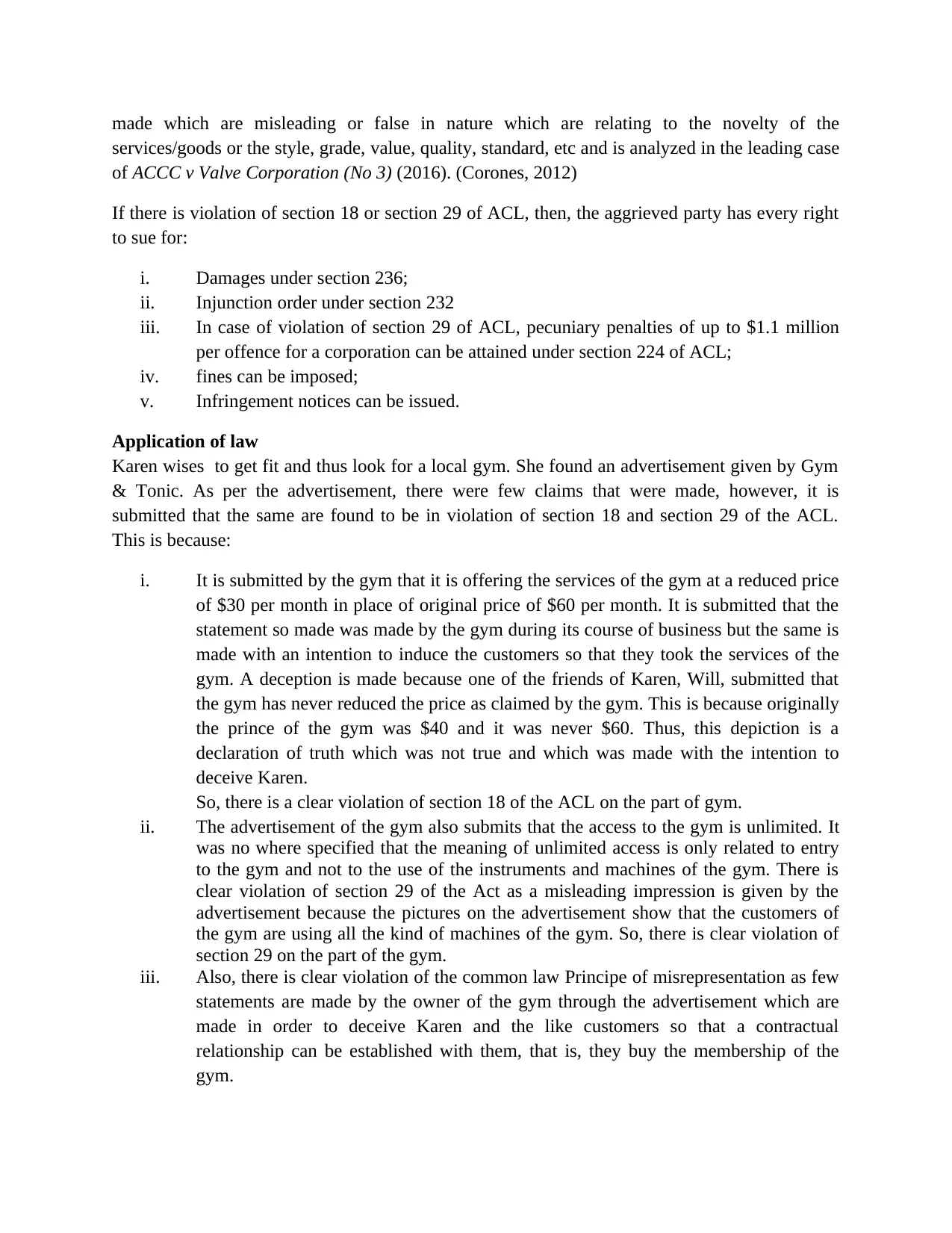
made which are misleading or false in nature which are relating to the novelty of the
services/goods or the style, grade, value, quality, standard, etc and is analyzed in the leading case
of ACCC v Valve Corporation (No 3) (2016). (Corones, 2012)
If there is violation of section 18 or section 29 of ACL, then, the aggrieved party has every right
to sue for:
i. Damages under section 236;
ii. Injunction order under section 232
iii. In case of violation of section 29 of ACL, pecuniary penalties of up to $1.1 million
per offence for a corporation can be attained under section 224 of ACL;
iv. fines can be imposed;
v. Infringement notices can be issued.
Application of law
Karen wises to get fit and thus look for a local gym. She found an advertisement given by Gym
& Tonic. As per the advertisement, there were few claims that were made, however, it is
submitted that the same are found to be in violation of section 18 and section 29 of the ACL.
This is because:
i. It is submitted by the gym that it is offering the services of the gym at a reduced price
of $30 per month in place of original price of $60 per month. It is submitted that the
statement so made was made by the gym during its course of business but the same is
made with an intention to induce the customers so that they took the services of the
gym. A deception is made because one of the friends of Karen, Will, submitted that
the gym has never reduced the price as claimed by the gym. This is because originally
the prince of the gym was $40 and it was never $60. Thus, this depiction is a
declaration of truth which was not true and which was made with the intention to
deceive Karen.
So, there is a clear violation of section 18 of the ACL on the part of gym.
ii. The advertisement of the gym also submits that the access to the gym is unlimited. It
was no where specified that the meaning of unlimited access is only related to entry
to the gym and not to the use of the instruments and machines of the gym. There is
clear violation of section 29 of the Act as a misleading impression is given by the
advertisement because the pictures on the advertisement show that the customers of
the gym are using all the kind of machines of the gym. So, there is clear violation of
section 29 on the part of the gym.
iii. Also, there is clear violation of the common law Principe of misrepresentation as few
statements are made by the owner of the gym through the advertisement which are
made in order to deceive Karen and the like customers so that a contractual
relationship can be established with them, that is, they buy the membership of the
gym.
services/goods or the style, grade, value, quality, standard, etc and is analyzed in the leading case
of ACCC v Valve Corporation (No 3) (2016). (Corones, 2012)
If there is violation of section 18 or section 29 of ACL, then, the aggrieved party has every right
to sue for:
i. Damages under section 236;
ii. Injunction order under section 232
iii. In case of violation of section 29 of ACL, pecuniary penalties of up to $1.1 million
per offence for a corporation can be attained under section 224 of ACL;
iv. fines can be imposed;
v. Infringement notices can be issued.
Application of law
Karen wises to get fit and thus look for a local gym. She found an advertisement given by Gym
& Tonic. As per the advertisement, there were few claims that were made, however, it is
submitted that the same are found to be in violation of section 18 and section 29 of the ACL.
This is because:
i. It is submitted by the gym that it is offering the services of the gym at a reduced price
of $30 per month in place of original price of $60 per month. It is submitted that the
statement so made was made by the gym during its course of business but the same is
made with an intention to induce the customers so that they took the services of the
gym. A deception is made because one of the friends of Karen, Will, submitted that
the gym has never reduced the price as claimed by the gym. This is because originally
the prince of the gym was $40 and it was never $60. Thus, this depiction is a
declaration of truth which was not true and which was made with the intention to
deceive Karen.
So, there is a clear violation of section 18 of the ACL on the part of gym.
ii. The advertisement of the gym also submits that the access to the gym is unlimited. It
was no where specified that the meaning of unlimited access is only related to entry
to the gym and not to the use of the instruments and machines of the gym. There is
clear violation of section 29 of the Act as a misleading impression is given by the
advertisement because the pictures on the advertisement show that the customers of
the gym are using all the kind of machines of the gym. So, there is clear violation of
section 29 on the part of the gym.
iii. Also, there is clear violation of the common law Principe of misrepresentation as few
statements are made by the owner of the gym through the advertisement which are
made in order to deceive Karen and the like customers so that a contractual
relationship can be established with them, that is, they buy the membership of the
gym.
⊘ This is a preview!⊘
Do you want full access?
Subscribe today to unlock all pages.

Trusted by 1+ million students worldwide
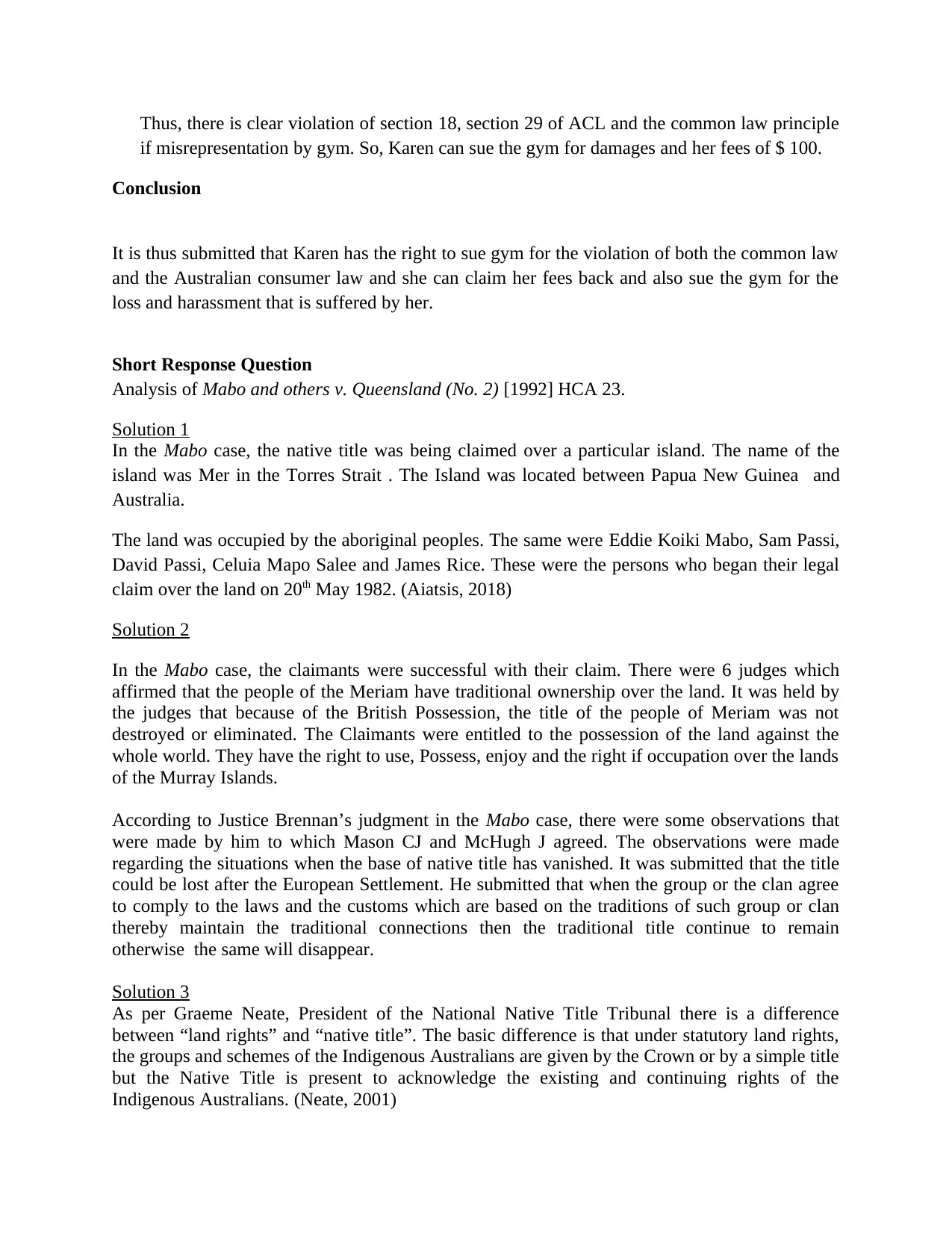
Thus, there is clear violation of section 18, section 29 of ACL and the common law principle
if misrepresentation by gym. So, Karen can sue the gym for damages and her fees of $ 100.
Conclusion
It is thus submitted that Karen has the right to sue gym for the violation of both the common law
and the Australian consumer law and she can claim her fees back and also sue the gym for the
loss and harassment that is suffered by her.
Short Response Question
Analysis of Mabo and others v. Queensland (No. 2) [1992] HCA 23.
Solution 1
In the Mabo case, the native title was being claimed over a particular island. The name of the
island was Mer in the Torres Strait . The Island was located between Papua New Guinea and
Australia.
The land was occupied by the aboriginal peoples. The same were Eddie Koiki Mabo, Sam Passi,
David Passi, Celuia Mapo Salee and James Rice. These were the persons who began their legal
claim over the land on 20th May 1982. (Aiatsis, 2018)
Solution 2
In the Mabo case, the claimants were successful with their claim. There were 6 judges which
affirmed that the people of the Meriam have traditional ownership over the land. It was held by
the judges that because of the British Possession, the title of the people of Meriam was not
destroyed or eliminated. The Claimants were entitled to the possession of the land against the
whole world. They have the right to use, Possess, enjoy and the right if occupation over the lands
of the Murray Islands.
According to Justice Brennan’s judgment in the Mabo case, there were some observations that
were made by him to which Mason CJ and McHugh J agreed. The observations were made
regarding the situations when the base of native title has vanished. It was submitted that the title
could be lost after the European Settlement. He submitted that when the group or the clan agree
to comply to the laws and the customs which are based on the traditions of such group or clan
thereby maintain the traditional connections then the traditional title continue to remain
otherwise the same will disappear.
Solution 3
As per Graeme Neate, President of the National Native Title Tribunal there is a difference
between “land rights” and “native title”. The basic difference is that under statutory land rights,
the groups and schemes of the Indigenous Australians are given by the Crown or by a simple title
but the Native Title is present to acknowledge the existing and continuing rights of the
Indigenous Australians. (Neate, 2001)
if misrepresentation by gym. So, Karen can sue the gym for damages and her fees of $ 100.
Conclusion
It is thus submitted that Karen has the right to sue gym for the violation of both the common law
and the Australian consumer law and she can claim her fees back and also sue the gym for the
loss and harassment that is suffered by her.
Short Response Question
Analysis of Mabo and others v. Queensland (No. 2) [1992] HCA 23.
Solution 1
In the Mabo case, the native title was being claimed over a particular island. The name of the
island was Mer in the Torres Strait . The Island was located between Papua New Guinea and
Australia.
The land was occupied by the aboriginal peoples. The same were Eddie Koiki Mabo, Sam Passi,
David Passi, Celuia Mapo Salee and James Rice. These were the persons who began their legal
claim over the land on 20th May 1982. (Aiatsis, 2018)
Solution 2
In the Mabo case, the claimants were successful with their claim. There were 6 judges which
affirmed that the people of the Meriam have traditional ownership over the land. It was held by
the judges that because of the British Possession, the title of the people of Meriam was not
destroyed or eliminated. The Claimants were entitled to the possession of the land against the
whole world. They have the right to use, Possess, enjoy and the right if occupation over the lands
of the Murray Islands.
According to Justice Brennan’s judgment in the Mabo case, there were some observations that
were made by him to which Mason CJ and McHugh J agreed. The observations were made
regarding the situations when the base of native title has vanished. It was submitted that the title
could be lost after the European Settlement. He submitted that when the group or the clan agree
to comply to the laws and the customs which are based on the traditions of such group or clan
thereby maintain the traditional connections then the traditional title continue to remain
otherwise the same will disappear.
Solution 3
As per Graeme Neate, President of the National Native Title Tribunal there is a difference
between “land rights” and “native title”. The basic difference is that under statutory land rights,
the groups and schemes of the Indigenous Australians are given by the Crown or by a simple title
but the Native Title is present to acknowledge the existing and continuing rights of the
Indigenous Australians. (Neate, 2001)
Paraphrase This Document
Need a fresh take? Get an instant paraphrase of this document with our AI Paraphraser
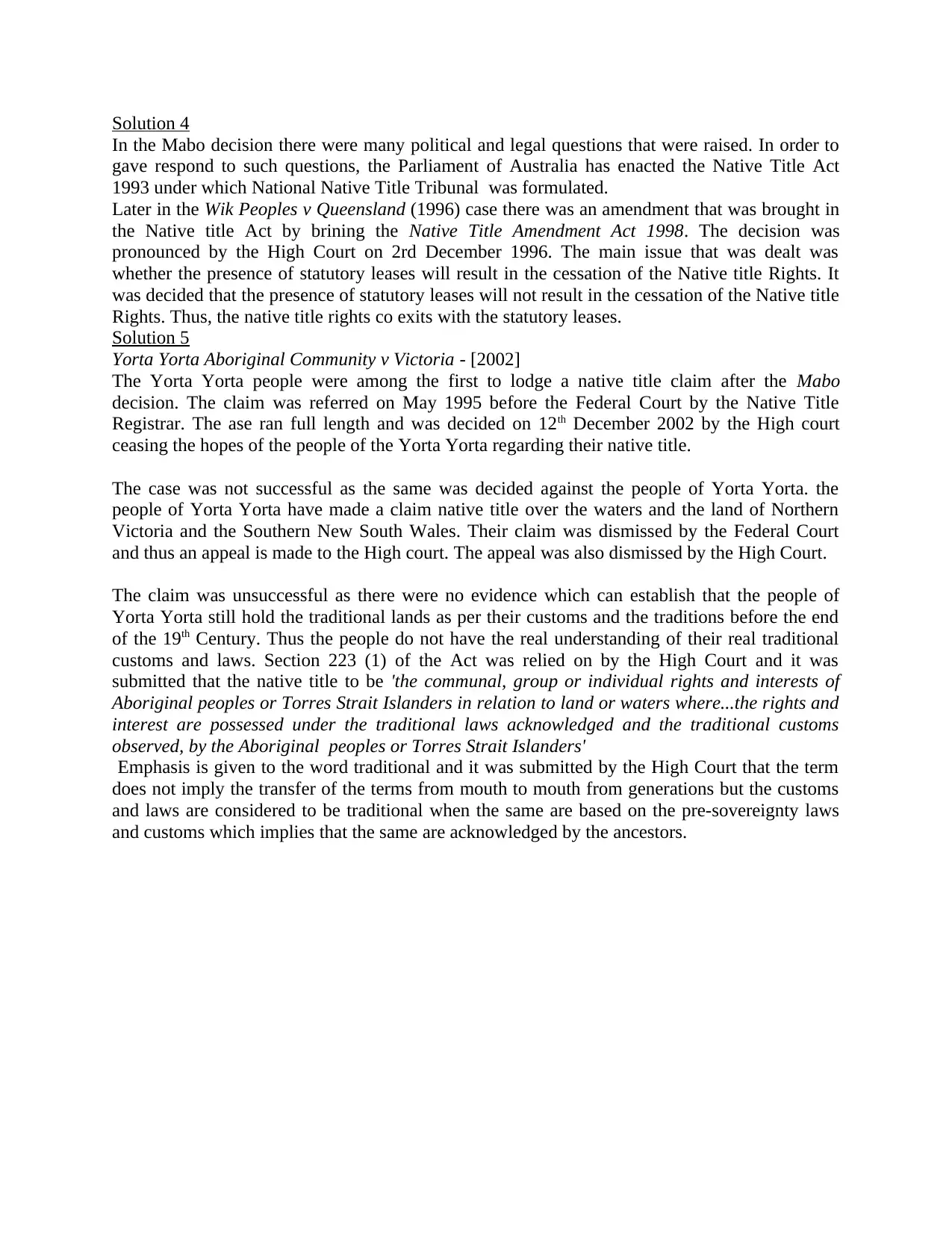
Solution 4
In the Mabo decision there were many political and legal questions that were raised. In order to
gave respond to such questions, the Parliament of Australia has enacted the Native Title Act
1993 under which National Native Title Tribunal was formulated.
Later in the Wik Peoples v Queensland (1996) case there was an amendment that was brought in
the Native title Act by brining the Native Title Amendment Act 1998. The decision was
pronounced by the High Court on 2rd December 1996. The main issue that was dealt was
whether the presence of statutory leases will result in the cessation of the Native title Rights. It
was decided that the presence of statutory leases will not result in the cessation of the Native title
Rights. Thus, the native title rights co exits with the statutory leases.
Solution 5
Yorta Yorta Aboriginal Community v Victoria - [2002]
The Yorta Yorta people were among the first to lodge a native title claim after the Mabo
decision. The claim was referred on May 1995 before the Federal Court by the Native Title
Registrar. The ase ran full length and was decided on 12th December 2002 by the High court
ceasing the hopes of the people of the Yorta Yorta regarding their native title.
The case was not successful as the same was decided against the people of Yorta Yorta. the
people of Yorta Yorta have made a claim native title over the waters and the land of Northern
Victoria and the Southern New South Wales. Their claim was dismissed by the Federal Court
and thus an appeal is made to the High court. The appeal was also dismissed by the High Court.
The claim was unsuccessful as there were no evidence which can establish that the people of
Yorta Yorta still hold the traditional lands as per their customs and the traditions before the end
of the 19th Century. Thus the people do not have the real understanding of their real traditional
customs and laws. Section 223 (1) of the Act was relied on by the High Court and it was
submitted that the native title to be 'the communal, group or individual rights and interests of
Aboriginal peoples or Torres Strait Islanders in relation to land or waters where...the rights and
interest are possessed under the traditional laws acknowledged and the traditional customs
observed, by the Aboriginal peoples or Torres Strait Islanders'
Emphasis is given to the word traditional and it was submitted by the High Court that the term
does not imply the transfer of the terms from mouth to mouth from generations but the customs
and laws are considered to be traditional when the same are based on the pre-sovereignty laws
and customs which implies that the same are acknowledged by the ancestors.
In the Mabo decision there were many political and legal questions that were raised. In order to
gave respond to such questions, the Parliament of Australia has enacted the Native Title Act
1993 under which National Native Title Tribunal was formulated.
Later in the Wik Peoples v Queensland (1996) case there was an amendment that was brought in
the Native title Act by brining the Native Title Amendment Act 1998. The decision was
pronounced by the High Court on 2rd December 1996. The main issue that was dealt was
whether the presence of statutory leases will result in the cessation of the Native title Rights. It
was decided that the presence of statutory leases will not result in the cessation of the Native title
Rights. Thus, the native title rights co exits with the statutory leases.
Solution 5
Yorta Yorta Aboriginal Community v Victoria - [2002]
The Yorta Yorta people were among the first to lodge a native title claim after the Mabo
decision. The claim was referred on May 1995 before the Federal Court by the Native Title
Registrar. The ase ran full length and was decided on 12th December 2002 by the High court
ceasing the hopes of the people of the Yorta Yorta regarding their native title.
The case was not successful as the same was decided against the people of Yorta Yorta. the
people of Yorta Yorta have made a claim native title over the waters and the land of Northern
Victoria and the Southern New South Wales. Their claim was dismissed by the Federal Court
and thus an appeal is made to the High court. The appeal was also dismissed by the High Court.
The claim was unsuccessful as there were no evidence which can establish that the people of
Yorta Yorta still hold the traditional lands as per their customs and the traditions before the end
of the 19th Century. Thus the people do not have the real understanding of their real traditional
customs and laws. Section 223 (1) of the Act was relied on by the High Court and it was
submitted that the native title to be 'the communal, group or individual rights and interests of
Aboriginal peoples or Torres Strait Islanders in relation to land or waters where...the rights and
interest are possessed under the traditional laws acknowledged and the traditional customs
observed, by the Aboriginal peoples or Torres Strait Islanders'
Emphasis is given to the word traditional and it was submitted by the High Court that the term
does not imply the transfer of the terms from mouth to mouth from generations but the customs
and laws are considered to be traditional when the same are based on the pre-sovereignty laws
and customs which implies that the same are acknowledged by the ancestors.
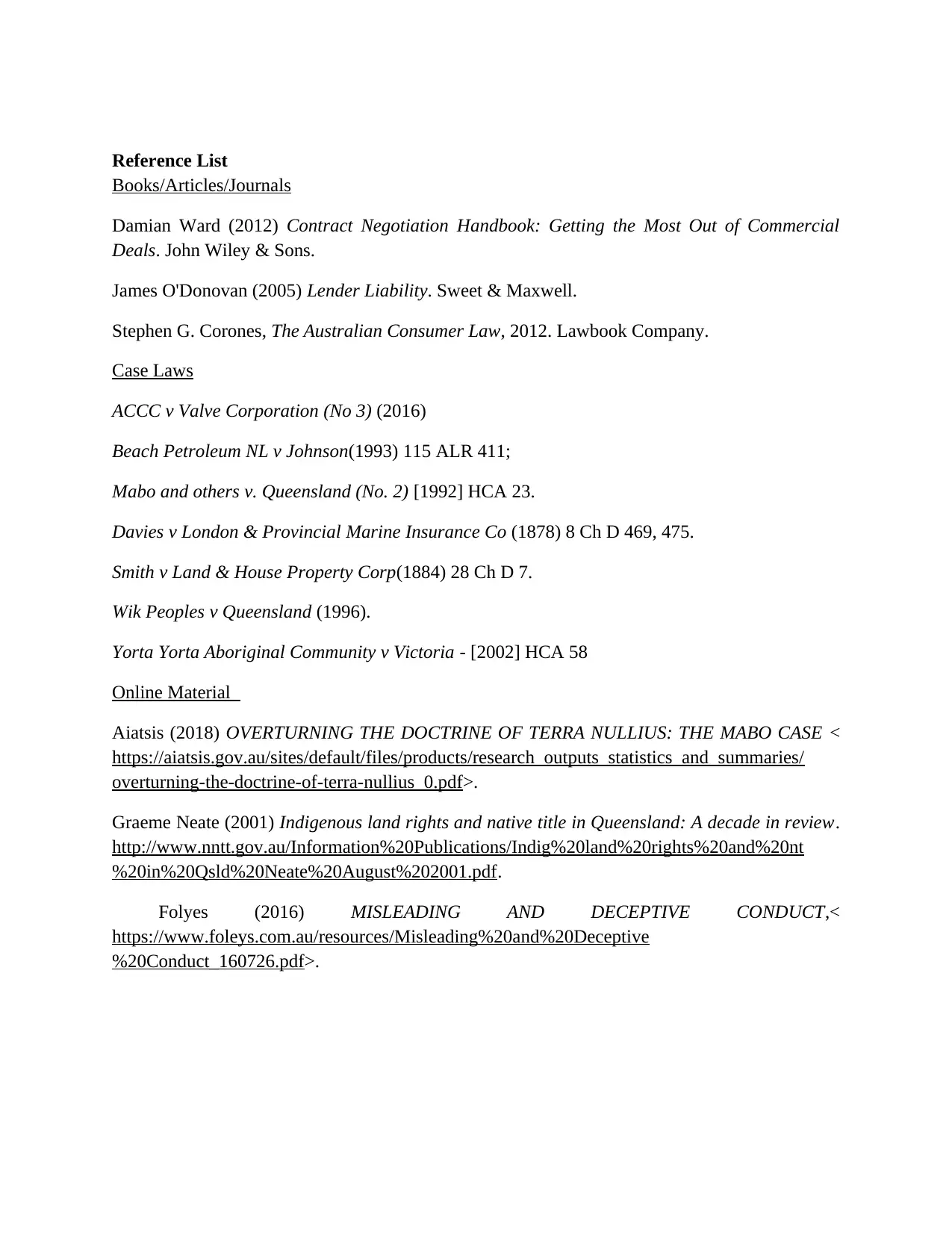
Reference List
Books/Articles/Journals
Damian Ward (2012) Contract Negotiation Handbook: Getting the Most Out of Commercial
Deals. John Wiley & Sons.
James O'Donovan (2005) Lender Liability. Sweet & Maxwell.
Stephen G. Corones, The Australian Consumer Law, 2012. Lawbook Company.
Case Laws
ACCC v Valve Corporation (No 3) (2016)
Beach Petroleum NL v Johnson(1993) 115 ALR 411;
Mabo and others v. Queensland (No. 2) [1992] HCA 23.
Davies v London & Provincial Marine Insurance Co (1878) 8 Ch D 469, 475.
Smith v Land & House Property Corp(1884) 28 Ch D 7.
Wik Peoples v Queensland (1996).
Yorta Yorta Aboriginal Community v Victoria - [2002] HCA 58
Online Material
Aiatsis (2018) OVERTURNING THE DOCTRINE OF TERRA NULLIUS: THE MABO CASE <
https://aiatsis.gov.au/sites/default/files/products/research_outputs_statistics_and_summaries/
overturning-the-doctrine-of-terra-nullius_0.pdf>.
Graeme Neate (2001) Indigenous land rights and native title in Queensland: A decade in review.
http://www.nntt.gov.au/Information%20Publications/Indig%20land%20rights%20and%20nt
%20in%20Qsld%20Neate%20August%202001.pdf.
Folyes (2016) MISLEADING AND DECEPTIVE CONDUCT,<
https://www.foleys.com.au/resources/Misleading%20and%20Deceptive
%20Conduct_160726.pdf>.
Books/Articles/Journals
Damian Ward (2012) Contract Negotiation Handbook: Getting the Most Out of Commercial
Deals. John Wiley & Sons.
James O'Donovan (2005) Lender Liability. Sweet & Maxwell.
Stephen G. Corones, The Australian Consumer Law, 2012. Lawbook Company.
Case Laws
ACCC v Valve Corporation (No 3) (2016)
Beach Petroleum NL v Johnson(1993) 115 ALR 411;
Mabo and others v. Queensland (No. 2) [1992] HCA 23.
Davies v London & Provincial Marine Insurance Co (1878) 8 Ch D 469, 475.
Smith v Land & House Property Corp(1884) 28 Ch D 7.
Wik Peoples v Queensland (1996).
Yorta Yorta Aboriginal Community v Victoria - [2002] HCA 58
Online Material
Aiatsis (2018) OVERTURNING THE DOCTRINE OF TERRA NULLIUS: THE MABO CASE <
https://aiatsis.gov.au/sites/default/files/products/research_outputs_statistics_and_summaries/
overturning-the-doctrine-of-terra-nullius_0.pdf>.
Graeme Neate (2001) Indigenous land rights and native title in Queensland: A decade in review.
http://www.nntt.gov.au/Information%20Publications/Indig%20land%20rights%20and%20nt
%20in%20Qsld%20Neate%20August%202001.pdf.
Folyes (2016) MISLEADING AND DECEPTIVE CONDUCT,<
https://www.foleys.com.au/resources/Misleading%20and%20Deceptive
%20Conduct_160726.pdf>.
⊘ This is a preview!⊘
Do you want full access?
Subscribe today to unlock all pages.

Trusted by 1+ million students worldwide
1 out of 6
Related Documents
Your All-in-One AI-Powered Toolkit for Academic Success.
+13062052269
info@desklib.com
Available 24*7 on WhatsApp / Email
![[object Object]](/_next/static/media/star-bottom.7253800d.svg)
Unlock your academic potential
Copyright © 2020–2026 A2Z Services. All Rights Reserved. Developed and managed by ZUCOL.





